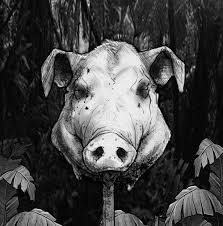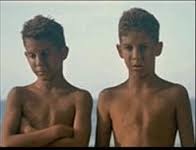- Lord of the Flies
Lord of the Flies is a 1954 novel by Nobel Prize-winning English author William Golding about a group of British boys stuck on an uninhabited island who try to govern themselves with disastrous results. Its stances on the already controversial subjects of human nature and individual welfare versus the common good earned it position 68 on the American Library Association’s list of the 100 most frequently challenged books of 1900–1999.
Published in 1954, Lord of the Flies was Golding’s first novel. Although it was not a great success at the time—selling fewer than 3,000 copies in the United States during 1955 before going out of print—it soon went on to become a best-seller. It has been adapted to film twice in English, in 1963 by Peter Brook and 1990 by Harry Hook, and once in Filipino (1976).

https://www.youtube.com/watch?v=CX4vZflew_A

Ralph - The novel’s protagonist, the twelve-year-old English boy who is elected leader of the group of boys marooned on the island. Ralph attempts to coordinate the boys’ efforts to build a miniature civilization on the island until they can be rescued. Ralph represents human beings’ civilizing instinct, as opposed to the savage instinct that Jack embodies.
Jack - The novel’s antagonist, one of the older boys stranded on the island. Jack becomes the leader of the hunters but longs for total power and becomes increasingly wild, barbaric, and cruel as the novel progresses. Jack, adept at manipulating the other boys, represents the instinct of savagery within human beings, as opposed to the civilizing instinct Ralph represents.

Roger - Jack’s “lieutenant.” A sadistic, cruel older boy who brutalizes the littluns and eventually murders Piggy by rolling a boulder onto him.

Simon - A shy, sensitive boy in the group. Simon, in some ways the only naturally “good” character on the island, behaves kindly toward the younger boys and is willing to work for the good of their community. Moreover, because his motivation is rooted in his deep feeling of connectedness to nature, Simon is the only character whose sense of morality does not seem to have been imposed by society. Simon represents a kind of natural goodness, as opposed to the unbridled evil of Jack and the imposed morality of civilization represented by Ralph and Piggy.

Piggy - Ralph’s “lieutenant.” A whiny, intellectual boy, Piggy’s inventiveness frequently leads to innovation, such as the makeshift sundial that the boys use to tell time. Piggy represents the scientific, rational side of civilization.

Sam and Eric - A pair of twins closely allied with Ralph. Sam and Eric are always together, and the other boys often treat them as a single entity, calling them “Samneric.” The easily excitable Sam and Eric are part of the group known as the “bigguns.” At the end of the novel, they fall victim to Jack’s manipulation and coercion.


 留言列表
留言列表


